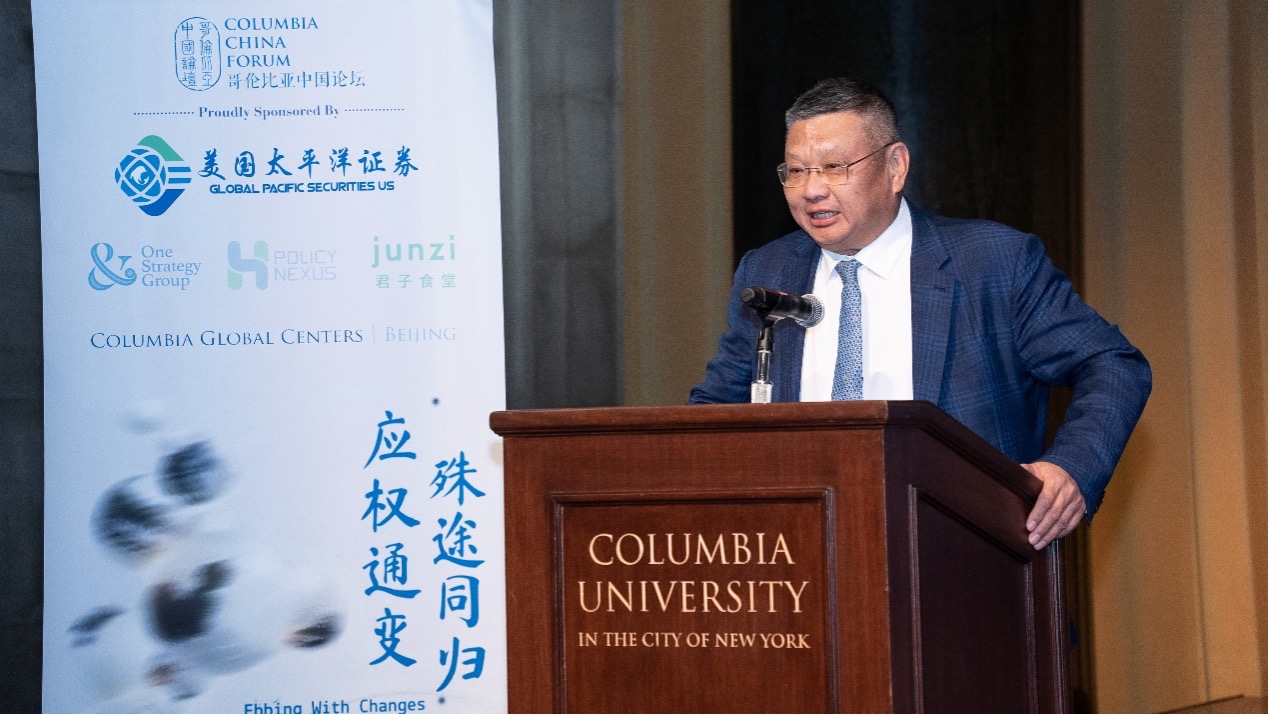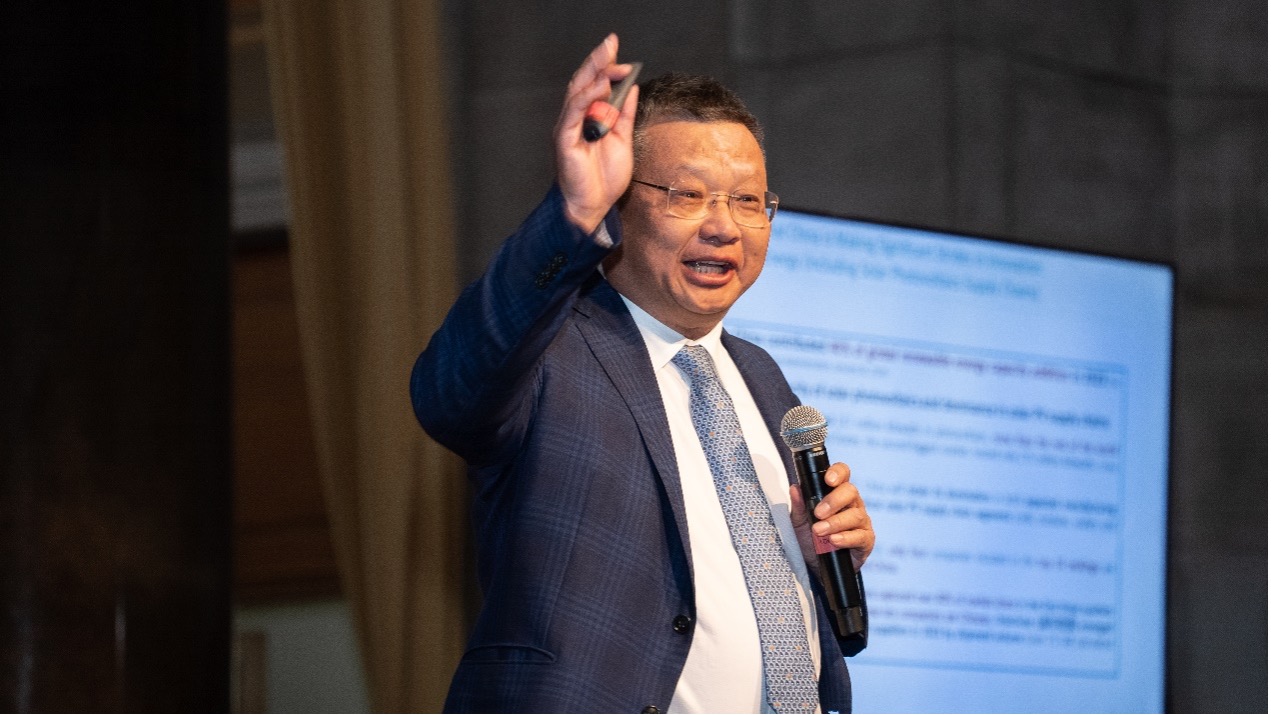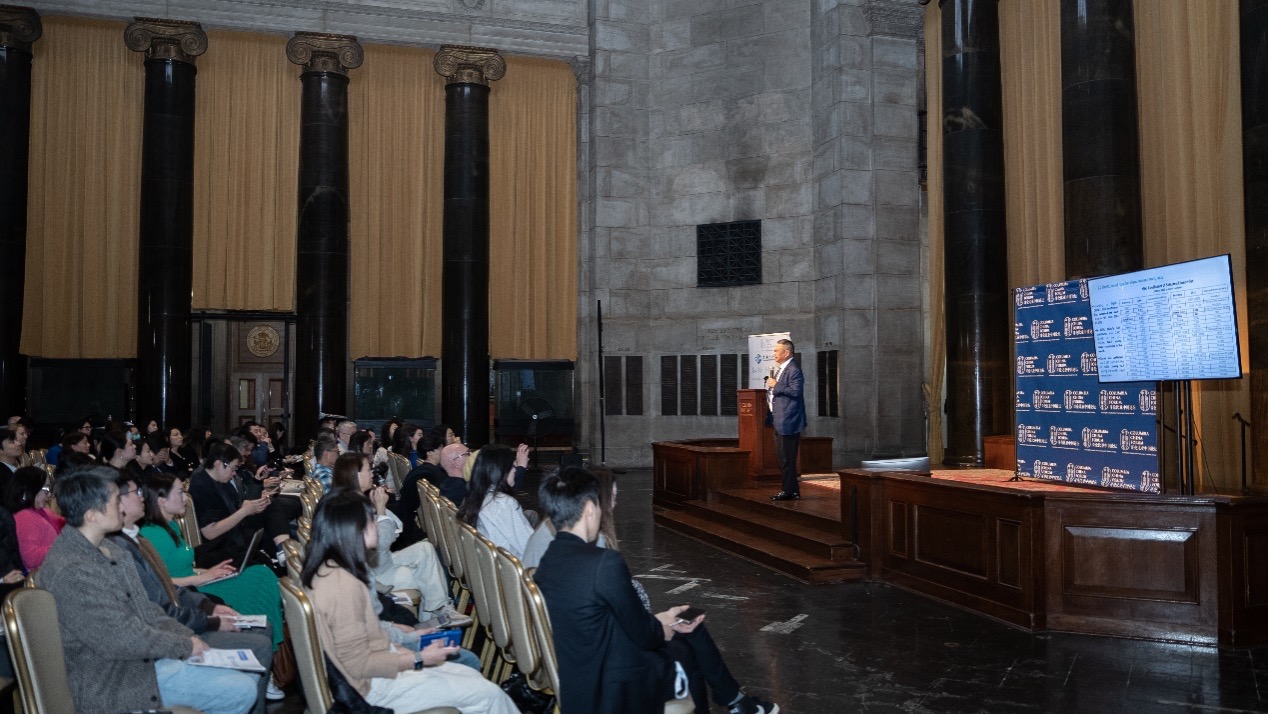On March 23, CKGSB Founding Dean and Dean’s Distinguished Chair Professor of China Business and Globalization, Xiang Bing, gave a keynote speech at the Columbia China Forum, where he addressed over 200 business professionals and Columbia University students on economic disruption and the next generation of unicorns.

In his speech, Dean Xiang first highlighted that neoliberalism has generated unprecedented wealth, prosperity and economic development since its initiation in 1979. China and the U.S., having embraced neoliberalism to a greater extent than many other economies, have emerged as the primary engines of global economic growth over the past four decades. Together, they contributed a staggering 44.9% of the total global GDP growth from 1979 to 2022. This dominance is further reflected in trade, with their combined share of world merchandise trade increasing to 23.26% in 2022 from 13.02% in 1979. Furthermore, from 2000 to 2022, a remarkable 52.7% of the global wealth increment stemmed from these two economic powerhouses.
Dean Xiang further emphasized that economic disruption is a major factor contributing to China and the U.S.’s substantial development. Particularly over the past two to three decades, these two nations have far outpaced the rest of the world in fostering economic disruption. (Economic disruption, a concept introduced by Dean Xiang in August 2019, may be measured by three key measures: the emergence of new large companies on the Fortune Global 500 list and the rise of newly-emerged billionaires on the Forbes Billionaires List since 2001, and the number of unicorn companies captured by CB Insights since 2015.)

The United States exhibits more innovation-driven and inclusive economic development. This is evidenced by the remarkable number of Nobel laureates: among the 186 Nobel Prizes awarded in the fields of Physics, Chemistry, and Physiology or Medicine from 2000 to 2023, a notable 111 (or 59.7%) were contributed by U.S. citizens. Furthermore, on 2023 New American Fortune 500 list, 44.8% of these companies (224 out of 500) were founded by immigrants or their children, which highlights the U.S.’s inclusivity in economic development. Besides, the U.S. has also fostered a cohort of “groundbreaking innovation companies” (such as Apple, Microsoft, and Tesla, etc.), which consistently deliver high value within their industries.
China’s development appears to be more disruptive-driven in comparison to that of the United States. In fact, China may have been the most disruptive economy in the past two decades. From 2001 to 2023, the number of Chinese Fortune Global 500 companies has surged from 11 to 129, representing 25.8% of the total. The number of Chinese billionaires on the Forbes Global Billionaires List has skyrocketed from 1 (in 2001) to 495 (in 2023). From 2015 to 2023, number of Chinese unicorns listed on CB Insights’ global unicorn list has grown from 22 to 169, making China the second-largest unicorn hub in the world.
To further explain his concept of economic disruption, Dean Xiang highlighted two factors based on his observation: Firstly, economic disruption is not equivalent to innovation. For example, the European Union, the United Kingdom, Switzerland, South Korea, and Japan have made remarkable strides in technological innovation during past 20 years. This is evidenced by their high rankings on the Global Innovation Index and their strong R&D investment intensity. However, their performance in generating economic disruption has been comparatively weaker (evident in the number of unicorn companies by the end of 2023: 105 from the EU, 53 from the UK, 7 from Japan, 15 from South Korea, and 5 from Switzerland). Secondly, economic disruption cannot be fully explained by the size of GDP or population. Consider the cases of China and India. In 1978, China and India had similar GDPs and China’s population was larger than India’s. Though India surpassed China in population size in 2022, China’s GDP is 5.2 times larger than India’s. China far outperforms India in the pace of creating new Fortune Global 500 enterprises, billionaires and unicorn companies.
Dean Xiang then emphasized that China’s progress in science and technology has been remarkable in recent years, fueled by a surge in investment (2.62% of GDP in 2023), its position as the world’s top origin of Patent Cooperation Treaty (PCT) applications since 2019, and a steady climb in the Global Innovation Ranking (from 34th in 2012 to 12th in 2023). However, China has yet to generate more famous companies that could be considered as “groundbreaking innovation companies”. “Bytedance, the parent company of TikTok, may be the only groundbreaking innovation company in China to date”, stated by Dean Xiang.

Fortunately, China is making significant strides in innovation across a number of sectors, including renewable energy, e-commerce, electric vehicles (EVs), lithium-ion battery manufacturing, and 5G technology, etc. This wave of innovation is propelling Chinese enterprises to disrupt global markets. As of 2023, China holds the leading position in installed capacity of renewable energy sources (solar power, wind power, hydropower and bioenergy) and is the world’s largest EV market (accounting for 59% of global sales with BYD remaining the top seller). Additionally, China has become the leading exporter of solar products, EVs and lithium-ion batteries (with total export of these three sectors reached 1.06 trillion yuan in 2023). Chinese internet platform companies have also achieved notable success in the U.S. market for the first time. A particularly remarkable example is ByteDance, which has held the title of the most valuable unicorn company for over five years, with a valuation significantly exceeding that of the largest American unicorn. TikTok, a subsidiary of Bytedance, was the most downloaded entertainment and video streaming app in 2022 and became the first non-game mobile app to generate $10 billion in consumer spending in 2023. Examples of e-commerce companies include Temu of Pinduoduo, which became the most downloaded free app in the United States by the end of 2022, and Shein, which was ranked as the second-fastest-growing brand on “The Fastest Growing Brands of 2023” among the U.S. millennial population and was listed as the 4th most valuable unicorn company by CB Insights as of March 19, 2024.
Therefore, Dean Xiang stated, “Economic disruption is central to economic prosperity and social mobility.” He believes that by tapping into the driving force of innovation and entrepreneurship, countries and businesses can release their potential and build a new competitive edge. Current economic development models still face challenges and limitations, such as income and wealth inequality, diminishing social mobility and sustainability issues. Fostering the next generation of unicorns and unicorn-to-be companies, with a renewed and enhanced emphasis on global responsibility, social purpose and long-term perspective may be a solution.
Since 2015, CKGSB has been at the forefront of establishing a global ecosystem for next-generation unicorn and aspiring unicorn companies’ founders through tailored executive programs. Nearly 1,200 founders or co-founders of companies with at least Series A funding have benefited from CKGSB’s programs, with 151 leading unicorn companies, including 41 listed on CB Insights between 2017 and 2022. CKGSB continues to collaborate with globally-renowned institutions like Columbia, UC San Diego, Johns Hopkins, ESMT and Stanford, to serve start-up founders worldwide.
The Columbia China Forum, themed “Ebbing with Changes, Flowing in Tandem” this year, serves as an international platform for discussions on China’s development and U.S.-China relations. Through engaging conversations among political, academic, business and cultural leaders, the forum aims to foster constructive dialogue and generate valuable insights. This year, Jeffrey Sachs, Director of Climate School at Columbia University and renowned American economist and public policy analyst, and Jane Sun, CEO of Trip.com, also spoke at the Columbia China Forum.
CKGSB is China’s first privately-funded, research-intensive and non-for-profit business school. The school aims to cultivate transformative business leaders with a global vision, sense of social responsibility, innovative mindset, and ability to lead with empathy and compassion. It aims to build a global ecosystem for the next generation of unicorns, with a renewed and enhanced emphasis on global responsibility, social purpose and long-term perspective.